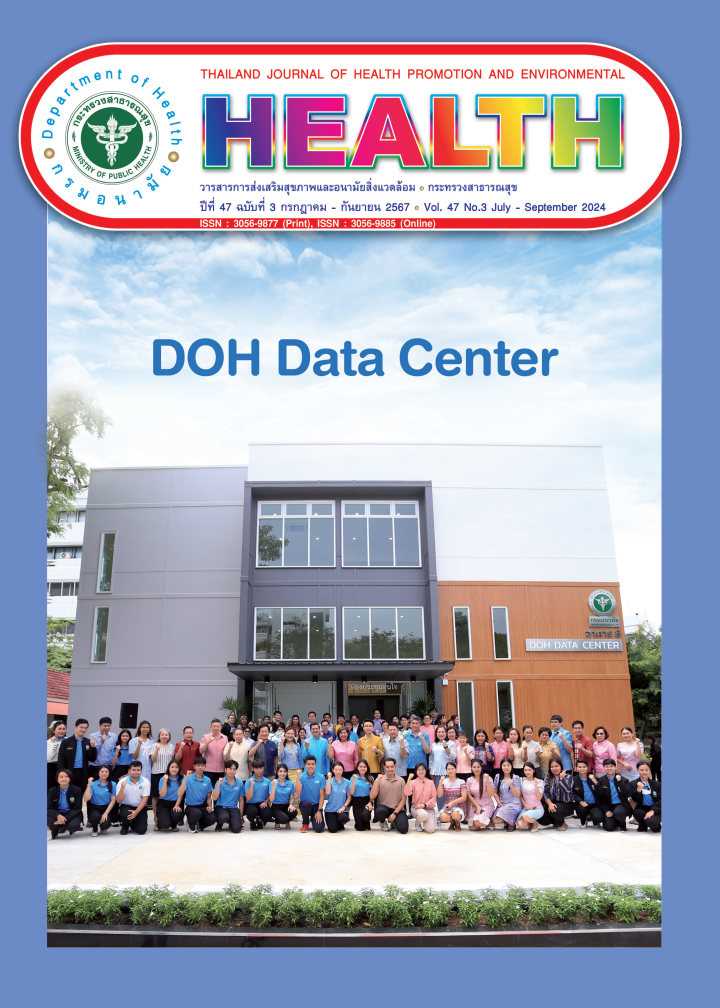Adapting to Change: A Mixed-Methods Study on Health Literate Family and Community Development in a New Normal Lifestyle
Keywords:
development model, family, health-informed community, family and community leaders, health promotion behavior, disease preventionAbstract
This research aims to develop a family upliftment model. Health-aware community under the new normal way of life to apply it to suit the context of the family and area. The population consisted of leaders who were volunteers from their families. Local communities carry out project work from 77 communities in every province across the country. The sample group was calculated from the G*Power3 program. The sample selection method was multi-stage random sampling and leaders willing to participate in the project from 11 provinces, 11 communities, divided into an experimental group of 361 people and a comparison group. 436 people, totaling 797 people. The study has 4 phases: 1) preparation phase. It sets the framework for the development of models and manual tools. 2) Implementation phase. It is the step of applying the developed model. There is a quasi-experimental research design in 2 groups by measuring before - after implementing the model, 3) the performance monitoring phase. and 4) reflecting on the performance results. Quantitative data were collected by questionnaire and qualitative data by focus group and in-depth interviews. Data analysis used descriptive statistics and content analysis. Operated between January-December 2023, Results of the study: Develop a family upliftment model. The community is well versed in health under the new normal way of life. In the first phase, they received a set of knowledge on ways to raise the level of their families. Health-aware community under the new normal way of life for family and community leaders, the format is an easily accessible E-book and guideline for selecting prototype areas. Family and community knowledge about health under the new normal way of life for officials to drive the implementation of healthy behavior change the second phase is the experimental phase. It was found that the experimental group that received the family enhancement model Health-aware community under the new normal way of life had higher scores on healthy behavior than before receiving the model Before receiving the model, the mean score x̄ =2.63, S.D.=0.41, after the experiment the mean score x̄ =2.87, S.D.=0.29 p-value<0.001 The difference was statistically significant at 0.05. The experimental group had a higher mean score in health behavior than the comparison group. Mean score x̄ =2.87 S.D. = 0.38 comparison group. There is a mean score x̄ =2.65 S.D. =0.27 p-value .001, which is significantly different at 0.05. Phase 3, performance monitoring and Phase 4, performance reflection. Found that the family leader The community continually applies knowledge. There is integration of good health promotion work by participate in families, communities, and local government organizations. Recommendations: Proposal for developing a family upliftment model Health-aware community under the new normal way of life. It is a format that has a process. Operational guidelines, tools, manuals to make people, families, and communities knowledgeable about health and have desirable health behaviors. Easily accessible training courses should be developed, and the Department of Health should provide certificates to those who complete the training and establish or add policies to promote family and community health
Downloads
Published
Issue
Section
License
Copyright (c) 2024 Thailand journal of Health Promotion and Environmental Health

This work is licensed under a Creative Commons Attribution-NonCommercial-NoDerivatives 4.0 International License.

